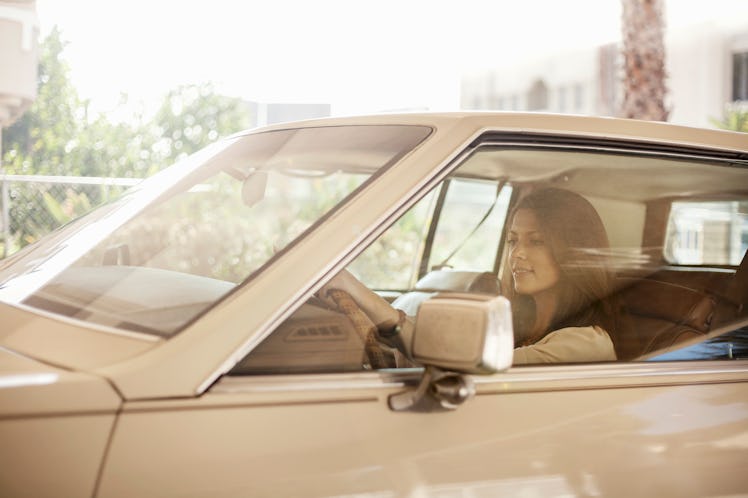
Here's Why Experts Are Cautioning Against Thanksgiving Travel This Year
Thanksgiving is notorious for being one of the biggest travel holidays of the year. And while the travel itself might not always be the most enjoyable, one of the best parts of the holiday is seeing friends and family you don’t often get to spend time with. As you solidify your holiday plans during the ongoing coronavirus pandemic, you're probably wondering if it's safe to travel for Thanksgiving 2020. Here's what you should consider before you book a trip.
With COVID-19 cases rising across many regions of the United States as of Nov. 13, it might not be the best time for travel. In fact, Thanksgiving recommendations from the U.S. Centers for Disease Control and Prevention (CDC) as of Nov. 12 caution against travel, stating the best way to avoid contracting or spreading COVID-19 is to stay home. You can keep up with the latest travel and holiday guidance on the CDC's website. Keri Althoff, Ph.D., associate professor in the Department of Epidemiology at the Johns Hopkins Bloomberg School of Public Health, spoke about travel risks during a Nov. 12 Bloomberg School of Public Health webinar on Thanksgiving celebrations and travel during the pandemic, echoing the CDC’s sentiment. "Holiday travel should be carefully considered. Staying at home is the lowest risk," says Althoff.
If you do travel, the CDC recommends getting a flu shot, wearing a mask over your nose and mouth, and practicing social distancing the entirety of the trip. You should also check the current COVID-19 risk wherever you’re planning to go. Rachael Piltch-Loeb, Ph.D., a preparedness fellow at Harvard University's T.H. Chan School of Public Health, tells Elite Daily "In an ideal world, you would not travel to a place where COVID-19 transmission is higher than where you live," says Piltch-Loeb. "If you [do] travel to a place of higher COVID-19 transmission, or if you are traveling in general, check the requirements where you live for quarantine or testing after returning."
Althoff echoed this sentiment during the webinar, saying, "Quarantine and isolation are important key tools in combating this epidemic." You should know your state’s policies on quarantining after a trip, as well as the policies of where you’re traveling. In addition, no matter how far you’re traveling, you should quarantine as much as possible before attending a Thanksgiving celebration. "The celebration may be just one single event, but it's actually the 14 days before, you're bringing all those exposures with you," says Althoff.
How you choose to travel will also affect the risk level. Piltch-Loeb recommends driving to your destination. "A personal car is likely the safest form of transportation because you minimize contact with other people during the travel process," she says. "Travel through airports, bus or train stations — and with people you don't know — contributes to a higher risk situation," explains Piltch-Loeb.
However you plan to travel, Piltch-Loeb suggests getting a COVID-19 test before you leave, with the best time being a couple days before your trip, and at least three days into your pre-trip isolation. "In an ideal world, if you are taking mass transit, you would want to test negative before traveling and after you arrive," she says. If you’re driving, testing once makes sense if you’re not in contact with others on your trip. But a negative test isn’t a free pass, since there is the possibility of a false-negative. If you do test negative, you should continue other risk mitigation efforts like wearing a face mask and sanitizing your hands often.
If you must travel, Piltch-Loeb stresses the importance of wearing a mask, implementing distancing where possible, and sanitizing your hands and seat. "If you can travel at off-peak times, that also would be better," she adds. "The big goal in traveling is to limit the number of people you come in contact with and keep as much space between you and others as you can."
Althoff warns you should try to reduce risk at all times. "When you are in line to check in, [go] through security, or board the plane, wear your mask, sanitize or wash your hands frequently, [and] be ready to accept abrupt changes to your travel plans," Althoff says. "Be sure to practice your statement of how you will encourage more distance between yourself and a stranger," she adds. "Do not travel if you feel unwell, if you are awaiting COVID test results, or if you're in quarantine after close contact with someone who has had COVID."
If you think you’re showing symptoms of coronavirus, which include fever, shortness of breath, and cough, call your doctor before going to get tested. If you’re anxious about the virus’s spread in your community, visit the CDC for up-to-date information and resources, or seek out mental health support. You can find all Elite Daily's coverage of coronavirus here.
Experts cited:
Rachael Piltch-Loeb, Ph.D, preparedness fellow at Harvard University's T.H. Chan School of Public Health
Keri Althoff, Ph.D., associate professor in the Department of Epidemiology at the Johns Hopkins Bloomberg School of Public Health
This article was originally published on